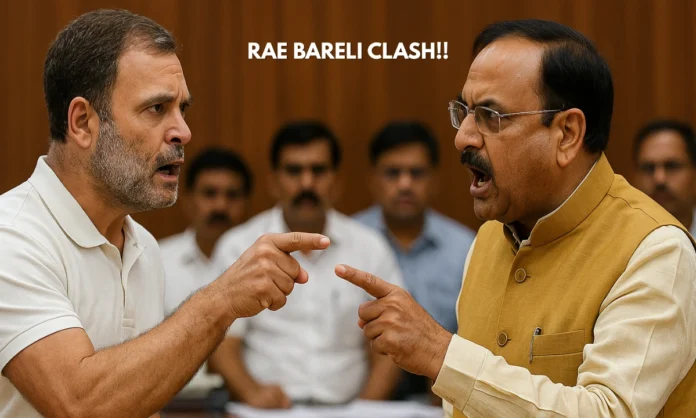Key Highlights:
- Verbal confrontation erupted between Rahul Gandhi and UP Minister Dinesh Pratap Singh during September 11 DISHA meeting in Rae Bareli
- Singh questioned Gandhi’s respect for parliamentary procedures while defending his adherence to meeting guidelines
- Clash centered on authority dynamics and proper scope of the 43-scheme DISHA framework
Political Tensions Explode in Rae Bareli
The Rahul Gandhi Dinesh Pratap Singh clash has dominated political headlines after a heated exchange during a District Development Coordination and Monitoring Committee meeting revealed deep-seated tensions between the Congress leader and BJP minister. The confrontation, which occurred on September 11, 2025, in Rae Bareli, highlighted fundamental disagreements about parliamentary authority and procedural adherence.
During the contentious DISHA meeting, Gandhi asserted his chairmanship authority by instructing Singh to seek permission before speaking, leading to Singh’s sharp retort about Gandhi’s own respect for the Lok Sabha Speaker. The Rahul Gandhi Dinesh Pratap Singh clash quickly went viral on social media, with the video capturing the raw political dynamics at play in Uttar Pradesh’s constituency politics.
Singh, a former Congress member who switched to BJP and previously contested against the Gandhi family in Rae Bareli, defended his position by highlighting Gandhi’s alleged disregard for parliamentary procedures. The Rahul Gandhi Dinesh Pratap Singh clash underscored the complex relationship between MPs and state ministers in development coordination meetings.
In the DISHA meeting, LoP Rahul Gandhi ji humbled down BJP minister Dinesh Pratap Singh.
— India With Congress (@UWCforYouth) September 12, 2025
The meeting, chaired by Rahul Gandhi ji was attended by MPs and MLAs from Amethi and Rae Bareli, including Singh. pic.twitter.com/tXzJSWovAg
DISHA Framework and Authority Structure
The Rahul Gandhi Dinesh Pratap Singh clash emerged from disagreements over the proper scope and conduct of DISHA meetings, which are mandated to occur quarterly under specific guidelines. According to official government data, the Ministry of Rural Development has established comprehensive protocols for these committees, with Lok Sabha MPs serving as chairpersons for their respective constituencies.
DISHA committees monitor 43 central government schemes across various ministries, with the primary objective being coordination between elected representatives and implementing officials. The Rahul Gandhi Dinesh Pratap Singh clash highlighted tensions when Singh argued that Gandhi exceeded his monitoring authority by engaging in discussions beyond the prescribed 43 schemes.
In Uttar Pradesh, district-level DISHA meetings have shown significant activity, with 124 meetings conducted during 2023-24, the highest among all states according to parliamentary data. The Rahul Gandhi Dinesh Pratap Singh clash reflects broader challenges in maintaining productive coordination between different political parties within this framework.
Political Background and Constituency Dynamics
The Rahul Gandhi Dinesh Pratap Singh clash carries additional weight given Singh’s political history and Gandhi’s recent electoral victory in Rae Bareli. Singh, who contested against Gandhi in the 2024 Lok Sabha elections as the BJP candidate, secured 297,619 votes compared to Gandhi’s decisive win with 687,649 votes, creating an underlying competitive dynamic.
Gandhi’s constituency encompasses six assembly seats including Bachharawan, Harchandpur, Raebareli, Sareni, Unchahar, and Salon, with a total population of approximately 2.9 million people spread across 4,043 square kilometers. The Rahul Gandhi Dinesh Pratap Singh clash occurred in this politically significant region where development coordination directly impacts millions of constituents.
The timing of the Rahul Gandhi Dinesh Pratap Singh clash during Gandhi’s two-day constituency visit from September 10-11 added political significance, as it represented one of his regular quarterly review sessions. Singh’s presence as a state minister and former electoral opponent created a unique dynamic that contributed to the confrontational atmosphere.
Procedural Disputes and Governance Implications
The Rahul Gandhi Dinesh Pratap Singh clash revealed fundamental disagreements about the proper conduct of development coordination meetings and the limits of MP authority. Singh’s criticism centered on Gandhi’s alleged deviation from DISHA guidelines, arguing that the meeting should focus exclusively on monitoring the utilization of funds for the 43 designated schemes.
According to DISHA protocols established by the Ministry of Rural Development, meetings must provide at least 15 days notice to all members and should be held quarterly with the senior-most Lok Sabha MP as chairperson. The Rahul Gandhi Dinesh Pratap Singh clash highlighted tensions when these procedural requirements intersect with political differences.
The incident has prompted discussions about cabinet discipline and appropriate conduct in multi-party governance settings. Singh’s post-meeting comments suggested that chief minister intervention might be necessary to address such confrontations, indicating that the Rahul Gandhi Dinesh Pratap Singh clash could have broader implications for Uttar Pradesh’s political stability.
Singh emphasized his willingness to support Gandhi on genuine development issues while opposing what he characterized as misuse of the DISHA platform for political criticism. This nuanced position reflects the complex nature of the Rahul Gandhi Dinesh Pratap Singh clash and its implications for future cooperation.
Final Assessment of Political Confrontation
The Rahul Gandhi Dinesh Pratap Singh clash represents more than a procedural dispute, embodying deeper tensions between opposition leadership and state governance in India’s federal system. Gandhi’s assertion of chairmanship authority conflicted with Singh’s interpretation of proper meeting scope, creating a confrontation that resonated beyond Rae Bareli’s boundaries.
The viral nature of the Rahul Gandhi Dinesh Pratap Singh clash demonstrates how local governance disputes can quickly escalate into national political narratives. Both leaders defended their positions based on different interpretations of parliamentary procedure and development coordination protocols, highlighting the challenges of multi-party cooperation in constituency development.
As DISHA meetings continue quarterly across India’s constituencies, the Rahul Gandhi Dinesh Pratap Singh clash may influence how future development coordination sessions navigate political sensitivities while maintaining focus on public welfare objectives. The incident underscores the ongoing evolution of India’s parliamentary democracy and the complex dynamics between different levels of elected representation.


